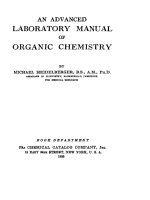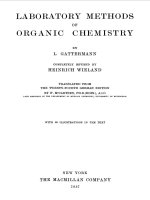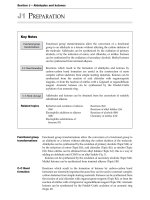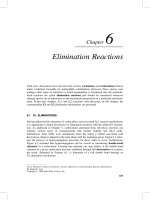Laboratory technique in organic chemistry
Bạn đang xem bản rút gọn của tài liệu. Xem và tải ngay bản đầy đủ của tài liệu tại đây (8.77 MB, 278 trang )
PLACEMENT INTERVIEWS
Skills for Success
www.pdfgrip.com
ABOUT THE AUTHOR
S. Anandamurugan obtained his bachelors degree in Electrical and Electronics
Engineering from Maharaja Engineering College, Avinashi under Bharathiyar University
and masters degree in Computer Science and Engineering from Arulmigu Kalasalingam
College of Engineering, Krishnan Koil under Madurai Kamaraj University. He is currently pursuing PhD in Wireless Sensor Networks in Anna University, Coimbatore.
A Senior Lecturer in the department of Computer Science and Engineering in Kongu
Engineering College, Perundurai, he has also been associated with the placement cell of
the college. He has received “Best Staff ” award for the year 2007-08. He is the life member of ISTE &
ACEEE.
www.pdfgrip.com
PLACEMENT INTERVIEWS
Skills for Success
S. Anandamurugan
Kongu Engineering College
Perundurai, Erode
Tata McGraw Hill Education Private Limited
NEW DELHI
McGraw-Hill Offices
New Delhi New York St Louis San Francisco Auckland Bogotá Caracas
Kuala Lumpur Lisbon London Madrid Mexico City Milan Montreal
San Juan Santiago Singapore Sydney Tokyo Toronto
www.pdfgrip.com
Published by the Tata McGraw Hill Education Private Limited,
7 West Patel Nagar, New Delhi 110 008.
Placement Interviews: Skills for Success
Copyright © 2011, by Tata McGraw Hill Education Private Limited. No part of this publication may be reproduced or
distributed in any form or by any means, electronic, mechanical, photocopying, recording, or otherwise or stored in a
database or retrieval system without the prior written permission of the publishers. The program listings (if any) may
be entered, stored and executed in a computer system, but they may not be reproduced for publication.
This edition can be exported from India only by the publishers,
Tata McGraw Hill Education Private Limited
ISBN-13: 978-0-07-070095-6
ISBN-10: 0-07-070095-8
Vice President and Managing Director—McGraw-Hill Education: Asia/Pacific Region: Ajay Shukla
Head—Higher Education Publishing and Marketing: Vibha Mahajan
Publishing Manager—B&E/HSSL: Tapas K Maji
Associate Sponsoring Editor: Hemant K Jha
Senior Development Editor: Shalini Negi
Executive (Editorial Services): Yogesh Kumar
Senior Production Manager: Manohar Lal
Senior Production Executive: Atul Gupta
Marketing Manager: Vijay S Jagannathan
Assistant Product Manager: Daisy Sachdeva
General Manager—Production: Rajender P Ghansela
Assistant General Manager—Production: B L Dogra
Information contained in this work has been obtained by Tata McGraw-Hill, from sources believed to be reliable.
However, neither Tata McGraw-Hill nor its authors guarantee the accuracy or completeness of any information
published herein, and neither Tata McGraw-Hill nor its authors shall be responsible for any errors, omissions, or
damages arising out of use of this information. This work is published with the understanding that Tata McGraw-Hill
and its authors are supplying information but are not attempting to render engineering or other professional services.
If such services are required, the assistance of an appropriate professional should be sought.
Typeset at DSM Soft (P) Ltd, No. 1, 15th Cross Street, Shastri Nagar, Adyar, Chennai-600 020 and printed at
Avon Printers, Plot No. 6, Main Loni Road, Jawahar Nagar, Industrial Area, Shahdara, Delhi-110094
Cover Design: Meenu Raghav, Graphic Designer, TMH
Cover Printer: SDR Printers
RALYCRZCRARAZ
www.pdfgrip.com
Dedicated to
My Wife
Dr. S. Renukadevi
&
My Son
A. Shrikarthick
www.pdfgrip.com
www.pdfgrip.com
PREFACE
In today’s age, the job interviews and the related processes like the written tests and group discussions
hold the key to a good career. Be it a fresher, who is just out of the college, seeking job openings or a
well-established professional looking for new opportunities to better his or her career interests, the job
interview–and the success in it–has an important role in everyone’s pursuits.
The aim of this book is to cater to the needs of students and professionals preparing for interviews.
While the primary focus of the book is on the final year students from engineering colleges appearing
for the placement interviews, the book covers at length the general discussion on “how to” and “do’s and
don’ts” on various aspects of job interviews. It gives tips and suggestions on ‘how to face the interview’,
résumé preparation, soft skills, non-verbal communication, etiquettes and so on.
Keeping in mind the requirements of the primary target audience, two special chapters on preparing
for quantitative / analytical aptitude test and technical aptitude test have also been included in the book.
Rather than following a strictly text-book style of discussion, the book encapsulates, lists out and
highlights the important points related to interviews. This will make it easier for the readers to retain the
tips in their memory and apply them in live situations.
The book is organised into following chapters, keeping in mind the requirements of various sections
of the target audience:
• Skills for Winning a Job
• Résumé Preparation
• Interview and GD Skills
• Soft-skills and Non-verbal Communication
• Preparing for Quantitative/ Analytical Aptitude Test: Suggested Problems with Solutions
• Preparing for Technical Aptitude Test: Suggested Questions with Answers
In addition, the book offers two appendices giving further information:
• HR Systems and Labour Laws
• Information on Some Important Companies
It is hoped that this book will be useful for all preparing for job interviews at various stages of their
career. I welcome the suggestions for further improvements in the book.
S. ANANDAMURUGAN
www.pdfgrip.com
www.pdfgrip.com
ACKNOWLEDGEMENTS
I am very thankful to my principal Prof. S. Kuppusamy, Kongu Engineering College, for his kind cooperation. I wish to express my heartfelt thanks to Prof. S. Balamurugan, Dean, SCCS and Prof. N. Jayapathi,
HOD, CSE Department, for their support and encouragement.
I would like to express my thanks to my parents, Selvaraj, Annammal, my sister Rathi and her
daughter Varshini, for their love, trust, understanding, and every kind of support not only throughout
my book but also throughout my life.
I would also like to thank Tata McGraw Hill Education, New Delhi for taking up this book for
publication.
My special thanks are due to the reviewers of this book:
• Prof. Rajender Kumar Yadav, Ansal Institute of Technology, Gurgaon
• Prof. T Chellappa, MNM Jain Engineering College, Chennai
• Dr. Babita Tyagi, Raj Kumar Goel Institute of Technology, Ghaziabad
The comments and suggestions from these reviewers, among others, have helped me in giving a final
shape to this book.
S. ANANDAMURUGAN
www.pdfgrip.com
www.pdfgrip.com
CONTENTS
Preface
Acknowledgements
vii
ix
Chapter 1
Skills for Winning a Job
Chapter 2
Résumé Preparation
25
Chapter 3
Interview and GD Skills
39
Chapter 4
Soft Skills and Non-Verbal Communication
81
Chapter 5
Preparing for Quantitative /Analytical Aptitude Test:
Suggested Problems with Solutions
89
Chapter 6
Preparing for Technical Aptitude Test: Suggested Questions with Answers
1
207
Appendix A: HR Systems and Labour Laws
231
Appendix B: Information on Some Important Companies
239
www.pdfgrip.com
www.pdfgrip.com
1
SKILLS FOR WINNING A JOB
A prospective employer will be keen to judge different aspects of a candidate’s personality. It is up to the
candidate to exhibit his / her competency level for the job through answers to the questions that are asked.
In this chapter, we will illustrate how a question is aimed at evaluating a particular type of skill.
PERSONAL QUALITIES
Analytical skills
1. Are you analytical? Give us one example of your analytical abilities.
2. Tell us about a particularly difficult problem that you analysed and what was your recommendation?
Career
1. Where do you want to be 5 years from now in your career?
2. Where do you see yourself 10 years from now?
Confidence
1. How confident are you that you can successfully perform the duties of this position and why?
2. Tell us about a situation that would demonstrate the level of confidence that you have in
yourself.
www.pdfgrip.com
2
•
Placement Interviews: Skills for Success
3. Tell us about a situation that would demonstrate the level of confidence your manager has in you.
4. Tell us about a situation that would show the confidence your co-workers have in you.
Creativity
1. Are you creative? Give us one example of your creativity.
2. Describe a situation where you came up with a creative solution to a problem.
Decision-making
1.
2.
3.
4.
What type of decisions do you make in your current position?
What decisions are easiest for you to make and which ones are the most difficult? Why?
What steps are involved in making a decision?
What items of information do you typically need before you make a decision?
Independent/self-starter
1. Provide us with an example of your ability to work independently.
Interpersonal
1.
2.
3.
4.
5.
6.
7.
8.
9.
10.
11.
12.
13.
14.
15.
16.
17.
What do you think your supervisor would say about your work?
What do you think your co-worker would say about your work?
What would your boss say about you—both positive and negative?
What would your subordinates say about you—both positive and negative?
What would your co-workers say about you—both positive and negative?
What three keywords would your peers use to describe you?
What one thing would your boss say that he/she has the greatest problem with you?
Describe a situation in which your work was criticised? How did you respond to the criticism?
How would your subordinates describe you?
When did you lost your temper last time? Tell us about that.
What situations make you lose your temper?
Tell us about the worst supervisor under whom you have worked.
Tell us about the best supervisor under whom you have worked.
Tell us about a confrontation that you have had with a co-worker.
How do you maintain an effective working relationship with your co-workers?
How would your best friend describe you?
How would your worst enemy describe you?
Judgement
1. In instances where you are required to assert yourself, what do you do to assert yourself
effectively?
2. Tell us about your morals and integrity.
3. Describe your ethics for us.
4. Narrate a confrontation that you have had with your supervisor. Who was wrong and why?
5. Did you ever dealt with an ethical question on the job. How did you handle the situation?
6. What did you do the last time when you were asked to submit a report that had been, due to
time and resource constraints, compromised on quality?
www.pdfgrip.com
Skills for Winning a Job •
7. Tell us about a situation that would exemplify your integrity.
8. Describe a politically sensitive situation that you were in and how did you handle the situation?
9. Tell us about a situation where you made a mistake. How did you handle the mistake and what
was your resolution?
10. Under what circumstances should you bypass your supervisor and go to your supervisor’s
supervisor?
11. Give us a situation that illustrates your ability to exercise good judgement.
Pressure
1. What experience have you had in handling pressure situations?
2. Tell us about a pressure situation you were in, that would demonstrate your ability to work
under pressure.
3. Provide us with an example of how you have asserted yourself in an emergency or highpressure situation.
4. What does it take to get under your skin?
5. What are some constructive methods of dealing with stress?
Responsibility
1. Briefly describe the most significant responsibility you have had in your career and what it
taught you?
2. How do you handle responsibility?
Risk
1. How do you deal with a risk on the job?
2. Name the greatest risk that you have taken?
3. Name the greatest risk that you had taken which resulted in failure.
Strengths
1.
2.
3.
4.
Why should we hire you?
What are your three greatest strengths?
What can you contribute to our organisation?
Assume that you are a candidate in the coming general election. Tell me why you are the best
candidate in the field.
5. We have interviewed a number of highly qualified students for this position. What sets you
apart from the others?
6. What part of your current job are you most comfortable with?
7. What are your strong points and how have they helped you to succeed?
Weaknesses
1.
2.
3.
4.
5.
Name your three greatest weaknesses.
Which is the worst of your three greatest weaknesses and why?
What part of your current job are you least comfortable with?
What steps have you taken to overcome your weaknesses?
What are the area where you need to improve?
3
www.pdfgrip.com
4
•
Placement Interviews: Skills for Success
Yourself
1.
2.
3.
4.
5.
6.
7.
Tell us about the passion in your life relating to your work.
What are your most outstanding qualities?
If you were to start your own company, what would that company do?
Tell me about the last book that you read.
What is your favourite colour and what does it reflect in your personality?
Rate yourself from 1 to 10 on your work ethic with 10 being the best.
Describe yourself.
EFFECTIVE COMMUNICATION
General
1. How do you effectively communicate with others?
Co-workers
1. What are the rules that you would like to follow to ensure effective communication with your
co-workers?
2. What are the means of communication in the workplace for you?
Supervisors
1. How can a supervisor establish effective communications with staff ?
2. What means of communication may be used to effectively establish a new policy?
3. Are there any additional considerations in communicating to groups of employees versus
individual employees?
4. What are some good rules to be kept in mind when directing employees?
5. In what instances is written communication better than verbal communication?
Communicating with your supervisor
1. Communicating with your supervisor is an important aspect of all of our jobs. In addition
to being brief, what guidelines should you follow to communicate effectively with your
supervisor?
2. What are the reasons for communicating upwards to your superiors?
EXPERIENCE AND EDUCATION
Education
1.
2.
3.
4.
5.
How does your experience and education qualify you for this job?
How does your education qualify you for this job?
Why did you choose to attend the college that you are attending?
What aspect of your education applies to this position?
What training have you received that qualifies you for this job?
www.pdfgrip.com
Skills for Winning a Job •
6. What have you done outside of formal education to improve yourself ?
7. What training opportunities have you taken advantage of and why?
Experience
1.
2.
3.
4.
5.
6.
7.
8.
9.
10.
11.
12.
13.
14.
15.
16.
17.
18.
19.
20.
21.
22.
23.
24.
Tell us about yourself.
How are you qualified for this job?
How does your current job qualify you for this position?
How does your experience qualify you for this job?
Describe a typical day at your present position.
What were your three greatest accomplishments on your last job?
What are some of the things on your current job you have done well?
What is the most difficult assignment you have had?
What accomplishment on the job are you most proud of ?
What steps have you taken to improve your job skills?
What significant contributions have you made to the operation of your work group?
How has your current position prepared you to take on greater responsibilities?
What makes you more qualified than the other candidates?
Why do you want to leave your current job?
Tell us about your qualifications for this position.
What actions have you taken in the past 10 years to prepare you for this position?
What steps have you taken in the past 2 years to improve your qualifications?
In the areas where your experience falls short for this job, what steps will you take to make up
for this shortfall?
Describe yourself.
What skills and abilities do you have?
Recall an incident where you made a major mistake. What did you do after the mistake was
made? What did you learn from this mistake?
What is the greatest failure you have had? What would you have done differently?
What action on the job are you least proud of ?
Tell us about a difficult situation that you encountered. How did you resolve it?
MOTIVATION
Entry level
1. One of the requirements for this position is that the individual be a self-starter. Give us an
example of your ability to be a self-starter.
2. How do you motivate yourself to complete unpleasant assignments?
Advanced
1.
2.
3.
4.
What motivational techniques do you use with your work unit?
What can a supervisor do to enhance an employee’s job and the employee’s motivation?
What motivates employees?
What demotivates an employee?
5
www.pdfgrip.com
6
•
Placement Interviews: Skills for Success
5. What are some of the ways in which a supervisor can motivate staff ?
6. In a public service organisation, supervisors typically do not have the ability to give employees promotions, bonuses or pay increases. Are there any other positive motivational tools that
public service organisation supervisors have?
7. Tell us about a situation where you motivated your staff to extraordinary accomplishments.
FIRST JOB AND NEW JOB
First job
1.
2.
3.
4.
5.
6.
7.
How has your education prepared you for this position?
Which courses that you took will contribute the most to your effective performance in this job?
What was the single most important lesson that you have learnt in school?
What do you like the most about the career that you are seeking?
What do you like the least about the career that you are seeking?
Why did you choose the college that you attended?
Why did you select the major that you did?
New job
1.
2.
3.
4.
5.
6.
7.
8.
9.
10.
11.
12.
13.
14.
15.
16.
17.
18.
19.
20.
21.
22.
What salary are you seeking?
Why should we pay you the salary that you are seeking?
What is the most attractive aspect of the job you are being interviewed for?
What is the least attractive aspect of the job you are being interviewed for?
In order to successfully meet the responsibilities of this position, which of your personal
qualities will be of the greatest benefit?
What part of the job that you are being interviewed for do you look forward to the most?
What part of the job that you are being interviewed for do you look forward to the least?
What aspect of our organisation has the greatest appeal for you?
Knowing our organisation and the position that you are being interviewed for, where can you
make the greatest contribution?
How will the job you are being interviewed for fit into your career plans?
Why did you choose this profession and this specific job?
What do you think your responsibilities will be if you are hired?
Why are you interested in the position?
What are you seeking from this job?
What challenges do you think you will face in moving from your current position to this
position?
What aspect of the job announcement interested you the most?
In comparison to your current position, what do you think will be different in your new position?
Our company is more widely recognised than the current company that you are working for.
Why do you think it is?
Tell us why you believe you are ready to be promoted to the next level of management.
How can you contribute to our company?
What do you know about our company?
What interests you about a career in the field of new job?
www.pdfgrip.com
Skills for Winning a Job •
23. Why should we give you a chance to perform in this job?
24. Why should we hire you instead of the other candidates?
25. A number of candidates have more experience than you do. Why should we hire you instead
of one of the other candidates?
26. Why do you want this job and how does it fit you?
27. What do you intend to accomplish as a (title of the new job) with our company?
28. Why should we hire you?
PERSONAL QUALITIES—SITUATIONS
1. You are sitting next to a co-worker who is consistently rude to others over the telephone. You
realise that no one is aware of this. How would you handle this situation?
2. You are given a new assignment, but not given any instructions. How would you go about
completing your assignment?
3. A vital piece of equipment requires repair. You are the only mechanic certified to repair the
piece of equipment. You receive a call that your father is on his way to the hospital. What will
you do?
4. Your co-worker continually comes over to your desk to complain about management. Your
supervisor seems to be paying particular attention to the two of you. How will you handle this
situation?
5. An executive manager has given you an assignment that will require you to work late tonight. However, you have dinner and expensive tickets to a picture with your friend tonight.
What will you do?
6. You have prepared a report for the county supervisors. All facts have been documented,
checked and double-checked. However, one of the supervisors states that the report is wrong
and demands that the report be corrected. What is your response to the supervisor?
7. Your co-worker is consistently unconcerned with issues at work. You and your co-worker have
a joint assignment, but the co-worker just ignores the assignment. What steps will you take?
8. As you are walking out of the building, you notice an employee from another section carrying
department equipment to his/her car. The equipment is clearly labelled and belongs to your
section’s work area. What will you do?
9. You work on a field crew using heavy equipment. After lunch you notice the smell of alcohol
on your co-worker’s breath. How will you handle this situation?
10. One of the members of your team only does what is absolutely necessary at work. His performance is impacting the team. How might this person’s performance affect your work? Would
you work overtime to complete a team project?
PRESENTATIONS
1. What experience have you had in making presentations?
2. You have been asked to address a citizens group regarding a particularly sensitive environmental issue. What steps will you take to ensure your success?
3. What steps can you take to ensure a successful presentation?
4. Your assignment is to present a technical presentation to lay people. What steps can you take
to ensure that your presentation is easily understood?
7
www.pdfgrip.com
8
•
Placement Interviews: Skills for Success
5.
6.
7.
8.
9.
10.
11.
Name the characteristics of an effective presentation.
What techniques do you use when faced with a hostile audience?
What factors influence the success of a presentation?
What is the purpose of audiovisual aids in a presentation?
Which audiovisual aids have you found to be most effective and why?
Tell us about the most difficult presentation that you have made.
To what extent have you used presentation software such as PowerPoint in preparing and
presenting presentations?
12. What steps do you take to handle reporters effectively?
PRIORITISATION
1. You are given a number of assignments. How will you prioritise the assignments?
2. Along with your other assignments, you have been given a rush assignment that has to be done.
What adjustments or considerations will you make in trying to complete the rush assignment?
3. In your supervisor’s absence you have been asked to schedule the work of the group for the
next 2 weeks. How would you schedule projects, assignments and vacations?
4. To perform your duties more efficiently and reduce interruptions, what steps should be taken
when given a new assignment?
5. Your new assignment is to establish a working area for one professional and two clerical employees. What would you consider in laying out the work area?
6. On what basis should a supervisor schedule and assign work?
7. What is the importance of prioritising work?
8. How do you prioritise your work?
9. Your section supervisor has given you a rush assignment. The assignment is in conflict with
an assignment that was given to you by the section supervisor’s boss. How will you handle
these assignments?
PROBLEM-SOLVING
1.
2.
3.
4.
5.
Provide us with an example of your problem-solving ability.
What are the essential elements of effective problem-solving?
Tell us about a situation in which you were required to analyse and solve a complex problem.
How have you incorporated collaborative problem-solving in your organisation?
What are the benefits of collaborative problem-solving?
PROCESS AND PROCEDURES
1.
2.
3.
4.
5.
6.
What is process?
What are procedures?
Why are procedures necessary in an organisation?
What is the difference between process and procedures?
Tell us about your experience in implementing a new process.
How can you involve staff in changing and implementing the revised process?
www.pdfgrip.com
Skills for Winning a Job •
7. Tell us about your experience in implementing a new process. What was the result of the
implementation?
8. What are the steps in developing a new procedure?
9. What are the steps involved in streamlining a process?
10. Your assignment is to make a process more efficient and cost-effective. What methods might
you use?
11. What experience have you had in flowcharting?
12. What actions would you take to simplify work?
TEAMWORK
Entry level
1. What are the characteristics of a successful team?
2. Tell us about an unsuccessful team of which you were a member. What, if anything, could you
have done differently?
3. Tell us about a successful team of which you were a member. What was the most outstanding
characteristic of that team? What was your contribution?
4. What are the important qualities a person should have to become an effective team member?
5. What qualities do you have that make you an effective team player?
6. Do you work better by yourself or as part of a team?
7. How can you contribute to establish a positive working environment for our team?
8. What type of people do you work best with?
Advanced
1.
2.
3.
4.
5.
What factors would you consider in assembling a project team?
Name some of the pitfalls to be avoided in building an effective team.
Through what tools can a committee become more useful or productive?
What actions can a supervisor take to establish teamwork in the organisation?
You supervise a group of civilian employees. Your employees appear to be at odds with the
uniformed personnel. What steps can you take to improve the teamwork between civilian and
uniformed personnel?
6. What are the advantages, if any, of establishing team goals as opposed to individual goals?
HANDLING CALLS
1. What is the importance of greeting the public politely on the telephone?
2. In taking a message for another employee, what information should be included on the
message?
3. Another department calls for your supervisor. Your supervisor is on the telephone. How will
you handle this call?
4. A customer calls and is irate because she has been transferred to three different departments
and cannot get anybody to answer her question. How will you handle the call?
5. Which telephone techniques are important when serving as a receptionist?
9
www.pdfgrip.com
10
•
Placement Interviews: Skills for Success
6. As a receptionist you are responsible for answering the telephones. What would you do if four
lines are ringing at the same time?
7. Your supervisor is on the telephone. An outside organisation calls and when you inform your
supervisor, he simply says ‘Handle it’. What will you do?
8. The supervisor returns after lunch and says that the information you took on the call slip is
incorrect. How will you handle this?
9. What are the basic rules for answering the telephone?
10. What are the basic rules for putting a customer on hold?
11. Name the steps to correctly transfer a customer call.
12. Name the steps to correctly take a message in a co-worker’s absence.
WORKING EFFECTIVELY WITH OTHERS
1. Tell us about your interpersonal skills.
2. What experience have you had working with external agencies?
3. Tell us about a situation in which you were required to work with
people at various levels within your organisation. What was the
most important step that you took to work effectively with these
people?
4. To what extent have your assignments required interface with other
departments?
5. Tell us about an incident in which you dealt with an irate customer,
which would demonstrate your ability to work effectively with
others.
6. In what kinds of situations do you find it most difficult to deal with
people?
7. Describe to us the extent to which you have worked with executive
or top management.
8. What has been your experience in working with community
organisations?
9. Tell us about your experience in working with volunteers.
10. To what extent have you worked in an ethnically, socio-economically and/or culturally diverse community?
11. Tell us about your experience in dealing with a variety of different people.
12. How do you handle difficult people?
ACCOUNTING
Entry level
1. What experience have you had as a cashier?
Accounts payable
1. How many invoices have you handled on a monthly basis?
2. What steps would you take before approving an invoice for payment?
www.pdfgrip.com
Skills for Winning a Job •
3.
4.
5.
6.
What items of information do you need before you can approve an invoice for payment?
Tell us about your experience in accounts payable.
Tell us about an invoice discrepancy that you discovered. How did you resolve the discrepancy?
Tell us about an invoice dispute that you were involved in. What was your role in resolving the
dispute?
7. Tell us about your experience in accounts payable.
Accounts receivable
1. To what extent were you involved in collections?
2. You have been asked to prepare a bill for services. What information should be included in
the bill?
Audit
1. Tell us about your experience in conducting audits.
Cost accounting
1.
2.
3.
4.
5.
Tell us about your experience in cost accounting.
Describe some of the methods used to allocate support costs.
What are fixed costs?
What are variable costs?
What is marginal cost?
Fixed assets
1. What experience have you had in fixed assets accounting?
General ledger
1. What experience do you have with general ledger?
Payroll
1. Based on Internal Revenue Service Rules, what criteria distinguish a consultant from an employee?
2. What experience have you had in payrolls?
Supervisory
1.
2.
3.
4.
5.
How do quality problems manifest themselves in an accounting department?
What cost-cutting measures have you implemented?
Which accounting systems are you familiar with?
Identify some important steps to take during the conversion of an accounting system.
What percentage of discounts lost did you have in Accounts Payable? Did the percentage
increase or decrease under your supervision?
PERFORMANCE MEASUREMENT AND BENCHMARKING
1. What is benchmarking?
2. What experience have you had in benchmarking?
11
www.pdfgrip.com
12
•
Placement Interviews: Skills for Success
3. Discuss the advantages and disadvantages of benchmarking a government agency to the public
sector and to the private sector.
4. What are the keys for implementing a performance measurement programme?
5. What are some of the means by which performance can be measured?
6. What requirements should be met in order to measure performance?
7. What does ‘best practices’ mean?
8. How would you communicate the implementation of performance measurements so as not to
let the staff get into a panic?
BUDGET/COST CONTROL
Budget
1. What is a budget?
2. What is zero-based budgeting?
3. Provide us with an example of how ‘zero-based budgeting’ would apply to the staffing in your
organisation.
4. What is the difference between a capital budget and an expense budget?
5. Name some typical operating expenses.
6. Why is it that the direct salary paid to an employee does not represent the total cost of the
employee to the organisation?
7. What experience have you had in developing a budget?
8. What is the purpose of a budget?
9. What are the steps involved in preparing a budget?
10. Have you conducted a budget review?
11. Define the internal rate of return.
12. How may the internal rate of return be used in capital budgeting?
13. What are the benefits of budgeting?
14. How would you prepare a cost/benefit analysis for an automation system?
Cost control
1. What are some of cost-cutting steps you could take to reduce fleet expenses?
2. Your expenditures for office supplies have increased by 50% over the past 2 years. What steps
will you take to determine the reason for the increase?
3. What is the relationship between a cost accounting system and a budget?
4. What benefits does a cost accounting system provide?
5. You have been asked to recommend some criteria for reducing the budget. What criteria will
you recommend?
6. You have been asked to reduce the information technology budget. How will you do it?
7. You have been asked to reduce the training budget. How would you determine the reductions?
8. Overtime expenditures have increased over the past year. Yet, the workload has not increased.
What steps will you take to control overtime?
9. You have been asked to reduce the staff for your organisation by 10%. How will you go
about this?
www.pdfgrip.com
Skills for Winning a Job •
10. Cost reduction is often associated with budget reductions. What are some positive means of
reducing costs?
11. What are the factors involved in a cost/benefit analysis?
12. What are the potential pitfalls when the variances of budget versus actual expenditures are
expressed only as percentages?
INFORMATION TECHNOLOGY
Disaster recovery/business resumption
1.
2.
3.
4.
What are the essential elements of a business resumption plan?
How is a disaster recovery/business resumption plan developed?
What is the purpose of a disaster recovery/business resumption plan?
What steps would you take to ensure that a disaster recovery/business resumption plan is tied
to business requirements?
E-commerce
1. Within the business environment, what are the operation areas that may be leveraged with
e-commerce?
2. Tell us about your experience with e-commerce.
3. What are some of the pitfalls when an e-commerce strategy is poorly executed?
4. Name five characteristics of successful e-commerce sites.
Help desk
1. What experience have you had in help desk operations?
2. What skills will you look for in staffing a help desk operation?
3. What items of information would you request from a user to effectively address a technical
problem?
13









